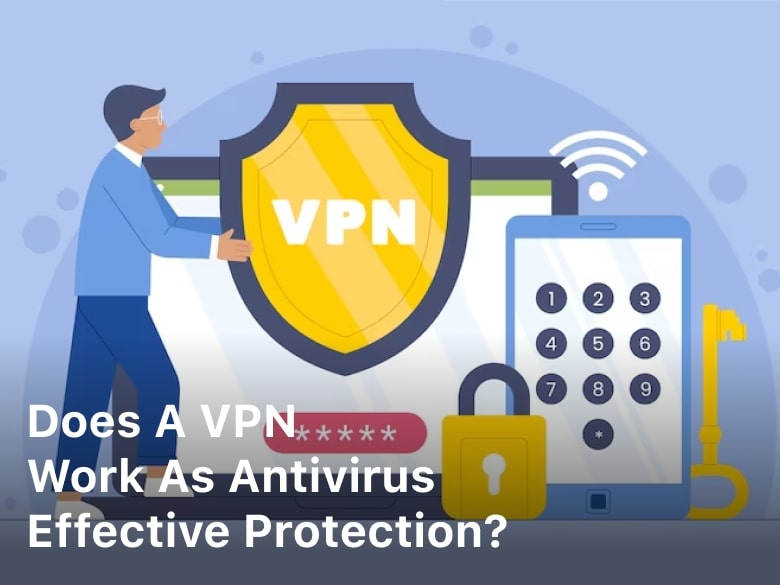Does a VPN Work as Antivirus Effective Protection?
Does a VPN Work as Antivirus Effective Protection?. In this comprehensive article, we delve into the effectiveness of VPNs as antivirus protection. Discover how VPN work, their potential to safeguard your online activities, and whether they can replace traditional antivirus software.
The digital landscape is rife with cyber threats, and safeguarding one’s online presence has become crucial. In this quest for security, people often wonder if a Virtual Private Network (VPN) can provide effective antivirus protection.
Does a VPN Work as Antivirus
VPNs and antivirus software serve different purposes, but they share some overlapping functionalities. In this article, we will explore the question, “Does a VPN work as antivirus effective protection?” to understand the potential of VPNs in securing our digital lives.
VPN and Antivirus
VPN
A VPN is a technology that establishes a secure and encrypted connection between your device and a remote server operated by the VPN service provider. This connection effectively tunnels your internet traffic through the server, masking your IP address and encrypting your data. It adds an extra layer of security and privacy, making it difficult for snoopers, hackers, or even your internet service provider (ISP) to monitor your online activities.
Antivirus Software
Antivirus software is designed to protect your device from various malicious software, commonly known as malware. These programs include viruses, Trojans, worms, spyware, and ransomware. Antivirus software scans files and applications, detects malicious code, and takes appropriate actions to quarantine or remove the threats.
The Overlapping Functions of VPNs and Antivirus Software
While VPNs and antivirus software are distinct in their purposes, they do have some common functionalities that contribute to online security.
Data Encryption: Shielding Information
Both VPNs and antivirus software contribute to data encryption, albeit in different ways. A VPN encrypts your internet traffic, securing your sensitive information from potential eavesdroppers. On the other hand, antivirus software encrypts files on your device, preventing unauthorized access to your data.
Protection against Phishing Attacks
Phishing attacks aim to trick users into divulging sensitive information, such as login credentials and credit card details, to malicious actors masquerading as trustworthy entities. VPNs can offer some protection against phishing by masking your IP address and location, making it harder for attackers to target you based on geolocation. Antivirus software often includes anti-phishing modules to detect and block phishing websites.
Enhanced Privacy: Evading Online Tracking
VPNs enhance privacy by obscuring your IP address and preventing websites and advertisers from tracking your online behavior. Similarly, some antivirus software includes features to block tracking cookies and protect your privacy.
Defense against Man-in-the-Middle Attacks
Man-in-the-middle (MITM) attacks involve intercepting communication between two parties to eavesdrop or manipulate the data exchanged. VPNs encrypt data during transmission, making it challenging for attackers to intercept and decipher the information. Some advanced antivirus solutions may also protect against certain MITM attacks.
Keep Reading : Exploring the Best VPN for YouTube Across the Globe in 2023

Keep Reading : VPN Hardware vs VPN Software
The Limitations of VPN as Antivirus Protection
While VPNs offer valuable security features, they have limitations when it comes to serving as a comprehensive antivirus solution.
No Direct Protection against Malware
VPN services primarily focus on encrypting and securing your internet traffic, but they do not actively scan for or remove malware from your device. Unlike antivirus software, which continually monitors your system for malicious software, VPNs lack this capability.
Inability to Detect and Remove Malicious Files
Antivirus software employs sophisticated scanning algorithms to identify and neutralize various forms of malware. VPNs do not have the ability to scan files on your device and, therefore, cannot detect or remove malware from your system.
No Behavioral Analysis
Antivirus software often incorporates behavioral analysis to identify previously unknown threats based on their behavior patterns. VPNs do not have access to such functionalities as their primary role is to provide secure connections.
Relying on Reputable VPN Services
The effectiveness of a VPN as antivirus protection depends on the quality and reputation of the VPN service provider. Opting for a reputable VPN service is essential to ensure the security and privacy of your data.
Keep Reading : VPN in Incognito Mode Google Chrome
The Synergy: Using VPNs and Antivirus Software Together
While VPNs and antivirus software have their respective roles, they complement each other when used together.
Comprehensive Protection
Using a VPN alongside antivirus software provides comprehensive protection against a broader range of cyber threats. Antivirus software defends your device from malware, while a VPN safeguards your online activities, making it harder for cybercriminals to exploit vulnerabilities.
Strengthening Data Privacy
The combination of a VPN and antivirus software strengthens your data privacy efforts. The VPN ensures encrypted internet traffic, and the antivirus shields your files and applications from unauthorized access.
Reducing Attack Surfaces
By deploying both VPN and antivirus measures, you reduce the attack surfaces available to potential hackers, significantly bolstering your overall security posture.
Comparing VPNs and Antivirus Software
Key Features of VPN
| VPN Features | Description |
|---|---|
| Encryption and Anonymity | VPNs encrypt internet traffic and hide IP addresses. |
| Geo-spoofing | Users can access content restricted to certain regions. |
| Public Wi-Fi Security | VPNs protect data transmission over public Wi-Fi. |
| Bypassing Censorship | VPNs can bypass internet censorship in some regions. |
| Virtual Locations | VPNs offer servers in various virtual locations. |
Key Features of Antivirus Software
| Antivirus Features | Description |
|---|---|
| Real-time Scanning | Continuous monitoring for active threats. |
| Malware Removal | Detecting and removing malicious software. |
| Firewall Protection | Blocking unauthorized network connections. |
| Automatic Updates | Ensuring the software is up-to-date with threats. |
| Email and Web Protection | Scanning email attachments and blocking unsafe sites. |
The Verdict: VPNs and Antivirus – A Dynamic Duo
A Complementary Approach
In conclusion, using a VPN alongside traditional antivirus software is a dynamic duo that enhances your overall online security and privacy. While VPNs offer distinct advantages in safeguarding your internet activities and identity, antivirus software’s core function of defending against malware remains irreplaceable.
Choosing the Right VPN and Antivirus Software
When selecting a VPN and antivirus software, consider your specific security needs, the reputation of the service providers, and their compatibility with your devices. Read user reviews and consult expert opinions to make an informed decision.
Keep Reading : How To Use VPN in Japan
FAQs
Is a VPN a replacement for antivirus software?
No, a VPN is not a replacement for antivirus software. While a VPN enhances your online security and privacy, it does not actively scan for and remove malware from your device. To ensure comprehensive protection, it is advisable to use both a VPN and antivirus software.
Can a VPN protect my device from viruses and malware?
A VPN primarily focuses on encrypting your internet traffic and securing your online activities. It does not have the capability to detect or remove viruses and malware from your device. Antivirus software is specifically designed for this purpose.
Will a VPN prevent phishing attacks?
VPNs can offer some protection against phishing attacks by masking your IP address and location, making it harder for attackers to target you based on geolocation. However, antivirus software often includes dedicated anti-phishing modules to detect and block phishing websites more effectively.
Can I use a free VPN instead of paid antivirus software?
While free VPNs can provide basic security features, they may come with limitations and potential risks. It is essential to remember that reputable antivirus software offers comprehensive protection and dedicated malware detection, making it a more reliable choice for safeguarding your device.
How often should I update my antivirus software?
Frequent updates are crucial to keep your antivirus software effective against the latest threats. Most reputable antivirus solutions provide automatic updates, ensuring your software stays up-to-date with the latest virus definitions and security patches.
Are VPNs legal to use?
VPNs are generally legal in most countries, but some nations impose restrictions on their usage. It is essential to research the legalities of VPN usage in your country and adhere to local laws and regulations.
Conclusion
In the ever-evolving digital landscape, both VPN and antivirus software play pivotal roles in protecting users from cyber threats. While a VPN offers enhanced privacy and safeguards your online activities, it cannot replace the core functions of antivirus software in detecting and removing malware. By using both technologies together, users can create a robust defense against a broad range of online threats, ensuring a safer and more secure online experience.




